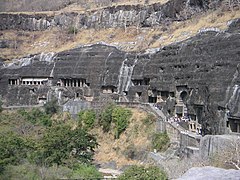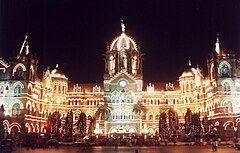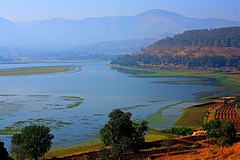Tourism in Maharashtra
Maharashtra attracts many tourists from different states and foreigners too[1] and was the fourth most visited state by domestic tourists in the country in 2014.[2] Aurangabad is the tourism capital of Maharashtra.[3]
Major urban centers include : Mumbai, Pune, Nashik, Aurangabad, Nanded and Nagpur.
City tourism
The eastern equivalent of New York City and Los Angeles, the financial capital and entertainment (Bollywood) capital of the country.[4] Places of interest include: Haji Ali Dargah situated about 500 yards from the shoreline in the middle of the Arabian Sea. Along with being a religious place, it is a great attraction for tourists, more than ten thousand people of all religions visit the place every day. Gateway of India, The Bandra-Worli Sea Link, Chhatrapati Shivaji Maharaj Vastu Sangrahalaya, Chatrapati Shivaji Terminus, a humongous architectural stone structure built by the British more than 200 years ago, Downtown Mumbai - reminiscent of the 19th century British architecture. Girgaon chowpati beach, Madh island beach and other beaches towards the south of Mumbai. Elephanta Caves, carved out of a giant stone on an island are a short ferry away into the Arabian sea. Due to its cosmopolitan nature, Mumbai has proven a popular tourism destination most often visited by Indians.
The cultural capital of the state of Maharashtra, is said to be the educational center of India. Pune has forts dating back to the seventeenth century such as Sinhagad, Purandar, Shaniwar Wada (a weekend residence of the Peshwas) and Lal Mahal (the red palace), residence of Chatrapati Shivaji maharaj. Pune also has educational institutes of repute such as Fergusson College, a 200-year-old college built by the British.
This city lies in the central part of Maharashtra and cultural attraction of tourists for cultural heritage places. The Shivleni Caves and Ambajogai Temple, The town named Ambajogai by goddess Ambabai - Yogeshwari a heritage temple. There is an ancient underground cave called Shivleni Caves (Hattikhana) or Jogai Mandap declared as a heritage point (Archaeological sites in Maharashtra), where Lord Shankar, Nandi and Elephants were carved in stone. The town has other heritage temples like [Sakleshwar] 12 khambhi, Kholeshwar, Mukundraj cave and Dasopant Swami Samadhi, Kashivishwanath, Amruteshwar, etc. In the 13th century "Swami Mukundraj" wrote first Marathi poetry 'Viveksindhu' [Meaning: The Ocean Of Wisdom'] in Ambajogai. This work is widely acclaimed for its literary quality as well as the philosophical content. It remains not only the first but among the best literary works ever produced in Marathi. Ambajogai has good connectivity by road and railways. Ambajogai is widely considered the educational and cultural capital of Marathwada.
This city lies in the central part of Maharashtra and attracts tourists for its natural beauty. The Ajanta Caves and Ellora Caves, that lie on the outskirts of Aurangabad are internationally renowned for man made caves and intricate carvings in them. Ellora is notable for having a unique monolithic vertically excavated building known as Kailasa temple, Ellora and Ajanta Caves is notably for Lord Buddha in stone. Ancient Buddhist life has been depicted in delicate stonework. While Ajanta is completely buddhist caves, Ellora caves belongs to Buddhism, Hinduism and Jainism. Summers are not advisable for touring as temperatures can reach up to and above 44 degrees C during the day. There are other famous places of interest like Bibi Ka Maqbara (The Taj Mahal of Deccan), Daulatabad Fort, Panchakki, Sunheri Mahal etc. Aurangabad has good connectivity by air, road and railways.
The winter capital of the state is a wonderful city. With a tradition of producing the best Oranges, this city is known as the City of Oranges. Nagpur is also known as second most greenest city in India due to number of trees in the city. The tourism in Nagpur is due to large number of National Parks/Wildlife Sanctuaries surrounding Nagpur. All of these sanctuaries have Tiger as their major attractions. Two notable National Parks around Nagpur are Pench National Park around 60km north of Nagpur, and Tadoba National Park around 180 km south of Nagpur. In a recent years, Tadoba National Park gained much importance among wildlife enthusiasts nationally and internationally due to the high probability of sighting Tigers. The other wildlife sanctuaries include Nagzira Wildlife Sanctuary around 110 km east of Nagpur, Melghat Tiger Reserve around 260 km west of Nagpur, Umred Karhandla Wildlife Sanctuary 60 km southeast of Nagpur, Bor Wildlife Sanctuary 60 km southwest of Nagpur, Kanha National Park 260 km northeast of Nagpur, Satpura National Park 270 km northwest of Nagpur.
Beside these Nagpur has much historical significance. Deekshabhoomi - the place where Dr. Babasaheb Ambedkar and lakhs of so-called lower caste who deemed as untouchables by Hindu caste system, embraced Buddhism. Another important place to visit is Tekadi Ganesh mandir on Sitabuildi fort complex. The city has other places of tourist importance such as Maharajbagh zoo, Futala lake chowpati, Raman science center and some premier research institutions such as NEERI, CICR, NBSSLUP. Nagpur is well connected with all major cities of India by roadways and railways, and also have international airport. Dr. Babasaheb Ambedkar International Airport (IATA: NAG, ICAO: VANP) is an international airport serving the city of Nagpur, Maharashtra, India. In 2005, it was named after B. R. Ambedkar, the chief architect of the Indian Constitution.
Nanded is a place of religious importance for adherents of the Sikh faith; its best known landmark is the Hazur Sahib Nanded Gurdwara, a former Sikh palace. Nanded is also the holy place for Hindus as it has Renukadevi shaktipeetha temple at Mahur. Nanded has many Sufi shrines as well.
Parbhani is well known for Sufi shrine of great saint Hazarat Shah Turabul Haq. Annual 2 week fair between 2 February to 15 February attracts around half a million tourists and followers. Because of its popularity within Maharashtra, it is often called as Ajmer Sharif of Maharashtra.
This city lies on western part of Maharashtra. It is known for tourist places like Mahabaleshwar, Wai, Panchgani and rivers such as Koyna and Krishna. Mahabaleshwar and Panchgani are one of the famous tourist places of India. Krishna originates at Mahabaleswar near the Jor village in the extreme north of Wai district. The Kaas plateau is also one of the most popular tourist attractions in Satara. This plateau falls under the Sahyadri Sub Cluster of Western Ghats which is now a UNESCO World Heritage Site.
Adventure tourism
Maharashtra offers the adventure lovers over 45 adventures to choose from across its length and breadth. It has over 550 forts to visit including over 20 Sea Forts, 720 km of coastline, the incredible vistas of its western ghats that has superb wildlife and camping possibilities. From water to land to aero, there is a host of adventures to choose from
- Paragliding
- Gliding
- Rock climbing
- Scuba diving
- Snorkeling
- Kayaking
- Canoeing
- Trekking
- Wildlife Safari
Nature tourism
Maharashtra has tremendous potential for Nature Tourism. Many private and public organizations have begun unique and innovative forms of nature tourism.
Hill stations

- Amboli
- Chikhaldara
- Igatpuri
- Jawhar
- Karjat
- Khandala
- Lavasa
- Lonavala
- Mahabaleshwar
- Matheran
- Panchgani
- Panhala
- Toranmal
Religious Tourism

Maharashtra boasts of a large number of popular and revered religious venues that are heavily frequented by locals as well as out-of-state visitors.
Shirdi, near Nashik is the location of the temple of Sai Baba - a hugely revered God-like priest and his birthplace at Pathri, Tuljabhavani temple at Tuljapur, Gajanan Maharaj temple at Shegaon, Mahalakshmi temple in south Mumbai, Haji Ali Dargah, a popular mosque built in the sea off the coast of Worli, Mount Mary church in the suburb of Bandra, Sarasbaugh Ganpati Mandir, Dagdusheth Halwai Ganpati. Some of the temples in Pune are Parvati temples, Chaturshringi Temple, Pataleshwar and many temples of Lord Ganesh in the cross roads of the peths. Osho Ashram in the area of Pune also one of the popular place which attracts number of devotees. Hazur Sahib Nanded, famous Gurdwara near Nanded, is also one of the tourist place in Maharashtra. Vithoba temple, Pandharpur is the main centre of worship for the Hindu deity Vithoba, believed to be a local form of god Krishna or Vishnu and his consort Rakhumai. It is the most visited temple in Maharashtra. The Warkaris start marching from their homes to the temple of Pandharpur in groups called Dindi (procession) to reach on Aashadhi ekadashi and Kartiki ekadashi. A dip in the holy river Chandrabhaga on whose banks Pandharpur resides, is believed to have power to wash all sins. All the devotees are allowed to touch the feet of the idol of Vithoba.
Gallery
-
The circular Nandi mandapa at the Pataleshwar cave temple, built during the Rashtrakuta Empire.
-
Hazur Sahib Nanded, 2nd holiest site in Sikhism
-
Chaturshringi Temple built by Chhatrapati Shivaji Raje Bhosale is in the midst of nature's scenic beauty.
-
Migratory birds at Jayakwadi Dam, main source of water for Marathwada.
-
A view of Parli Vaijnath Temple, Beed District.
-
Kailasha temple at Ellora Caves.
-
The Haji Ali Mosque was built in 1431, when Mumbai was under Islamic rule.[5]
-
Fergusson College is one of the oldest colleges in India.
-
Daulatabad (Deogiri) Fort
-
Mula and Mutha rivers
-
Siddhartha Garden
References
- ^ http://www.indianexpress.com/news/andhra-pradesh-top-tourist-destination-tourism-ministry/819071/0
- ^ http://www.rediff.com/business/slide-show/slide-show-1-indias-top-10-tourist-destinations/20110719.htm
- ^ Mishra, Ashish K. (15 May 2011). "The Value Hunters of Aurangabad". Forbes India. Forbes. Retrieved 30 May 2012.
- ^ "Mumbai, a land of opportunities". The Times Of India. 20 July 2011.
- ^ "Haji ali". Mumbai Mirror. 2008-08-07. Retrieved 2008-08-17.
External links
This section needs expansion. You can help by adding to it. (June 2008) |






















![The Haji Ali Mosque was built in 1431, when Mumbai was under Islamic rule.[5]](http://upload.wikimedia.org/wikipedia/commons/thumb/d/d4/Mumbai_03-2016_11_Haji_Ali_Dargah.jpg/240px-Mumbai_03-2016_11_Haji_Ali_Dargah.jpg)




